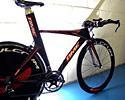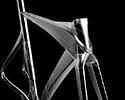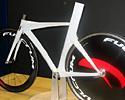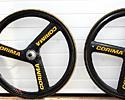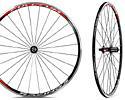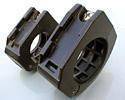
Recently on Cyclingnews.com |
Tech News – June 10, 2005Edited by John Stevenson Got tech? Send press releases, news, and tech questions to the Cyclingnews tech desk.
Rogers tests new Time TT rigWorld time trial champion Michael Rogers (Quick.Step) has a new weapon for races against the clock. The Australian has been testing a new frame from Time at the wind tunnel at Milan's Polytechnic College, and the results look good, with time claiming a 25 percent improvement in aerodynamics over the team's previous time trial rigs.
In fact what Time have come up with is what the company calls a 'module' - frame, fork, seatpost and handlebar, all designed to work together for maximum aerodynamic benefit. The new frame - dubbed RXR - started as a prototype back in March when Time staff and Quick.Step coach Luca Guercilena examined the aerodynamics of the team's existing equipment just before Milan San Remo. The then-proto RXR turned out to be substantially more slippery than the team's existing bikes, and production versions were made for the team.
Quick.Step is due to roll out on the new bikes at the UCI ProTour team time trial at Eindhoven on June 19, but one or two riders from Time-sponsored teams appeared to be using the new frames at Wednesday's time trial stage of the Dauphiné. More images of Rogers in the wind tunnel and the new bike
Corima rolls out new wheelSpeaking of the Dauphiné, Corima picked Wednesday's time trial to competition-test a prototype of its new three-spoke carbon fiber time trial wheel, equipping Alberto Contador of Liberty Seguros with the new hoops. An official launch is planned for the Tour de France, which implies that this proto is very close to the final production form. Corima claims that despite having one spoke fewer, the new wheel is stiffer than its previous design, as well as being lighter and more aerodynamic. A new form of carbon fiber is credited with enabling the improvements.
Fulcrum shaves gramsFulcrum Wheels has announced a significant improvement to its entry-level Racing 5 wheels. Following a successful Giro, in which riders on Fulcrum wheels won four stages and spent four days in pink, Fulcrum has switched from plain 2mm spokes on the Racing 5 to 2/1.8mm butted spokes. The change saves 90g, according to Fulcrum, so a pair of Racing 5s now weighs 1,840g - a pretty good weight for a set of all-purpose wheels that retail for €210 + VAT. More info: www.fulcrumwheels.com One-shot UltragenSupplement manufacturer First Endurance has announced the availability of a single-serve package of its Ultragen recovery product. Formulated for use immediately after training, when First Endurance claims the body's muscles "open the door to nutrients". The single-serve packet is intended for sportspeople to carry to races or rides so there's no need to lug around a big jar of the stuff. More info: www.firstendurance.com GPS mount for big bars
The move to 31.8mm clamps for handlebars has left many of us wondering how we're supposed to mount old stuff such as computers and heart rate monitors on our handlebars. Mountain bikers who use GPS for back-country navigation have the same problem, so British company TrackLogs has produced a mount for fat bars that works with any Garmin GPS unit. The new mount fits all bars from 25mm to 32mm and is supplied with rubber strips to tune the fit and protect your handlebar's surface. TrackLogs claims the new mount is just as secure as the original and points out that a GPS mounted on the bars has two advantages: you can see it (not the case if it's stuffed in a bag or pocket) and it can get a consistent fix on the GPS satellites, improving accuracy and battery life. More info: www.tracklogs.co.uk Eclipse self-repairing tyresSwiss company Eclipse has announced a new self-repairing inner tube for road and mountain bikes. However, instead of filling a tube with sealant and selling a one-off item, Eclipse is packaging up a kit of sealant, tube and valve. Why? Because sealants tend to dry with age, and eventually stop working, something Eclipse says takes 8-12 months with its system. But rather than throwing the tube away or replacing it, Eclipse allows you to replenish the sealant. Eclipse claims its sealant will plug holes up to 1.5mm in road bike tyres and 2mm in mountain bike tyres, with losses of 1.5 bar and 0.5 bar respectively before the seal takes effect. |
|||||||||


